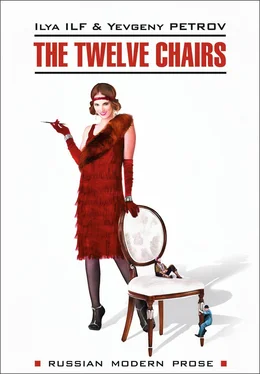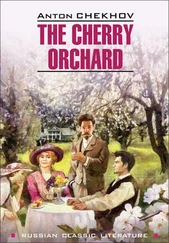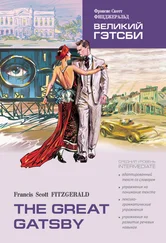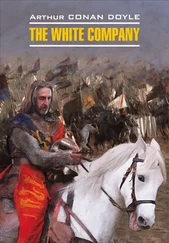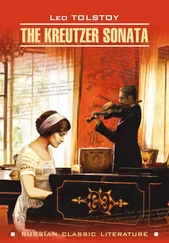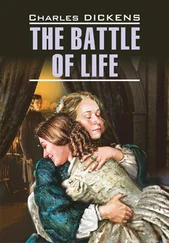Having achieved his aim, the young man promptly went down into the caretaker's room, took off his orange-coloured boots, and, stretching out on a bench, began thinking out a plan of action for the following day.
The young man's name was Ostap Bender. Of his background he would usually give only one detail. «My dad», he used to say, «was a Turkish citizen». During his life this son of a Turkish citizen had had many occupations. His lively nature had prevented him from devoting himself to any one thing for long and kept him roving through the country, finally bringing him to Stargorod without any socks and without a key, apartment, or money.
Lying in the caretaker's room, which was so warm that it stank, Ostap Bender weighed up in his mind two possibilities for a career.
He could become a polygamist and calmly move on from town to town, taking with him a suitcase containing his latest wife's valuables, or he could go the next day to the Stargorod Commission for the Improvement of Children's Living Conditions and suggest they undertake the popularization of a brilliantly devised, though yet unpainted, picture entitled «The Bolsheviks Answer Chamberlain» based on Repin's famous canvas «The Zaporozhe Cossacks Answer the Sultan». If it worked, this possibility could bring in four hundred or so roubles.
The two possibilities had been thought up by Ostap during his last stay in Moscow. The polygamy idea was conceived after reading a law-court report in the evening paper, which clearly stated that the convicted man was given only a two-year sentence, while the second idea came to Bender as he was looking round the Association of Revolutionary Artists' exhibition, having got in with a free pass.
Both possibilities had their drawbacks, however. To begin a career as a polygamist without a heavenly grey polka-dot suit was unthinkable. Moreover, at least ten roubles would be needed for purposes of representation and seduction. He could get married, of course, in his green field-suits, since his virility and good looks were absolutely irresistible to the provincial belles looking for husbands, but that would have been, as Ostap used to say, «poor workmanship». The question of the painting was not all plain sailing either. There might be difficulties of a purely technical nature. It might be awkward, for instance, to show Comrade Kalinin in a fur cap and white cape, while Comrade Chicherin was stripped to the waist. They could be depicted in ordinary dress, of course, but that would not be quite the same thing.
«It wouldn't have the right effect!» said Ostap aloud.
At this point he noticed that the caretaker had been prattling away for some time, apparently reminiscing about the previous owner of the house.
«The police chief used to salute him…. I'd go and wish him a happy new year, let's say, and he'd give me three roubles. At Easter, let's say, he'd give me another three roubles…. Then on his birthday, let's say. In a year I'd get as much as fifteen roubles from wishing him. He even promised to give me a medal. ‘I want my caretaker to have a medal,' he used to say. That's what he would say: „Tikhon, consider that you already have the medal.“»
«And did he give you one?»
«Wait a moment…. I don't want a caretaker without a medal,' he used to say. He went to St. Petersburg to get me a medal. Well, the first time it didn't work out. The officials didn't want to give me one. „The Tsar,“ he used to say, „has gone abroad. It isn't possible just now.“ So the master told me to wait. „Just wait a bit, Tikhon,“ he used to say, „you'll get your medal.“»
«And what happened to this master of yours? Did they bump him off?»
«No one bumped him off. He went away. What was the good of him staying here with the soldiers? … Do they give medals to caretakers nowadays?»
«Certainly. I can arrange one for you».
The caretaker looked at Bender with veneration.
«I can't be without one. It's that kind of work».
«Where did your master go?»
«Heaven knows. People say he went to Paris».
«Ah, white acacia-the emigre's flower! So he's an emigre!»
«Emigre yourself…. He went to Paris, so people say. And the house was taken over for old women. You greet them every day, but they don't even give you a ten-kopek bit! Yes, he was some master!»
At that moment the rusty bell above the door began to ring.
The caretaker ambled over to the door, opened it, and stepped back in complete amazement.
On the top step stood Ippolit Matveyevich Vorobyaninov with a black moustache and black hair. His eyes behind his pince-nez had a pre-revolutionary twinkle.
«Master!» bellowed Tikhon with delight. «Back from Paris!»
Ippolit Matveyevich became embarrassed by the presence of the stranger, whose bare purple feet he had just spotted protruding from behind the table, and was about to leave again when Ostap Bender briskly jumped up and made a low bow.
«This isn't Paris, but you're welcome to our abode».
Ippolit Matveyevich felt himself forced to say something.
«Hello, Tikhon. I certainly haven't come from Paris. Where did you get that strange idea from?»
But Ostap Bender, whose long and noble nose had caught the scent of roast meat, did not give the caretaker time to utter a word.
«Splendid», he said, narrowing his eyes. «You haven't come from Paris. You've no doubt come from Kologriv to visit your deceased grandmother».
As he spoke, he tenderly embraced the caretaker and pushed him outside the door before the old man had time to realize what was happening. When he finally gathered his wits, all he knew was that his master had come back from Paris, that he himself had been pushed out of his own room, and that he was clutching a rouble note in his left hand.
Carefully locking the door, Bender turned to Vorobyaninov, who was still standing in the middle of the room, and said:
«Take it easy, everything's all right! My name's Bender. You may have heard of me!»
«No, I haven't», said Ippolit Matveyevich nervously.
«No, how could the name of Ostap Bender be known in Paris? Is it warm there just now? It's a nice city. I have a married cousin there. She recently sent me a silk handkerchief by registered post».
«What rubbish is this?» exclaimed Ippolit Matveyevich. «What handkerchief? I haven't come from Paris at all. I've come from …»
«Marvellous! You've come from Morshansk!»
Ippolit Matveyevich had never had dealings with so spirited a young man as Ostap Bender and began to feel peculiar.
«Well, I'm going now», he said.
«Where are you going? You don't need to hurry anywhere. The secret police will come for you, anyway». Ippolit Matveyevich was speechless. He undid his coat with its threadbare velvet collar and sat down on the bench, glaring at Bender.
«I don't know what you mean», he said in a low voice.
«That's no harm. You soon will. Just one moment».
Ostap put on his orange-coloured boots and walked up and down the room.
«Which frontier did you cross? Was it the Polish, Finnish, or Rumanian frontier? An expensive pleasure, I imagine. A friend of mine recently crossed the frontier. He lives in Slavuta, on our side, and his wife's parents live on the other. He had a row with his wife over a family matter; she comes from a temperamental family. She spat in his face and ran across the frontier to her parents. The fellow sat around for a few days but found things weren't going well. There was no dinner and the room was dirty, so he decided to make it up with her. He waited till night and then crossed over to his mother-in-law. But the frontier guards nabbed him, trumped up a charge, and gave him six months. Later on he was expelled from the trade union. The wife, they say, has now gone back, the fool, and her husband is in prison. She is able to take him things…. Did you come that way, too?»
Читать дальше
